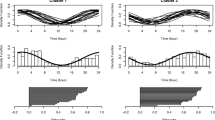Abstract
We investigate an application of Probabilistic Latent Semantics to the problem of device usage analysis in an infrastructure in which multiple users have access to a shared pool of devices delivering different kinds of service and service levels. Each invocation of a service by a user, called a job, is assumed to be logged simply as a co-occurrence of the identifier of the user and that of the device used. The data is best modelled by assuming that multiple latent variables (instead of a single one as in traditional PLSA) satisfying different types of constraints explain the observed variables of a job. We discuss the application of our model to the printing infrastructure in an office environment.
Preview
Unable to display preview. Download preview PDF.
Similar content being viewed by others
References
Anderson, T.W.: Some scaling methods and estimation procedures in the latent class model. In: Grenander, U. (ed.) Probability and Statistics. John Wiley & Sons, Chichester (1959)
Buntine, W.: Variational extensions to em and multinomial pca. In: Elomaa, T., Mannila, H., Toivonen, H. (eds.) ECML 2002. LNCS (LNAI), vol. 2430, pp. 23–34. Springer, Heidelberg (2002)
Dempster, A., Laird, N., Rubin, D.: Maximum likelihood from incomplete data via the EM algorithm. Journal of the Royal Statistical Society B 39, 1–38 (1977)
Gaussier, E., Goutte, C.: Probabilistic models for hierarchical clustering and categorisation: Applications in the information society. In: Proceedings of the Intl. Conf. on Advances in Infrastructure for Electronic Business, Education, Science and Medicine on the Internet, L’Aquila, Italy (2002)
Hofmann, T.: Probabilistic latent semantic analysis. In: Proc. of Uncertainty in Artificial Intelligence, UAI 1999 (1999)
Heierman III, E.O., Cook, D.J.: Improving home automation by discovering regularly occurring device usage patterns. In: Proceedings of the 3rd IEEE International Conference on Data Mining (ICDM 2003), Melbourne, Florida, USA, pp. 537–540 (2003)
Sammon, J.W.: A nonlinear mapping for data structure analysis. IEEE Transactions on Computers 18(5), 401–409 (1969)
Schwartz, G.: Estimating the dimension of a model. The Annals of Statistics 6(2), 461–464 (1978)
Author information
Authors and Affiliations
Editor information
Editors and Affiliations
Rights and permissions
Copyright information
© 2005 Springer-Verlag Berlin Heidelberg
About this paper
Cite this paper
Andreoli, JM., Bouchard, G. (2005). Probabilistic Latent Clustering of Device Usage. In: Famili, A.F., Kok, J.N., Peña, J.M., Siebes, A., Feelders, A. (eds) Advances in Intelligent Data Analysis VI. IDA 2005. Lecture Notes in Computer Science, vol 3646. Springer, Berlin, Heidelberg. https://doi.org/10.1007/11552253_1
Download citation
DOI: https://doi.org/10.1007/11552253_1
Publisher Name: Springer, Berlin, Heidelberg
Print ISBN: 978-3-540-28795-7
Online ISBN: 978-3-540-31926-9
eBook Packages: Computer ScienceComputer Science (R0)




